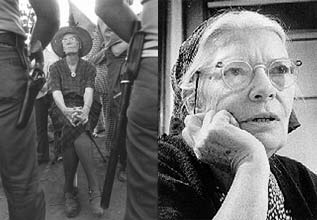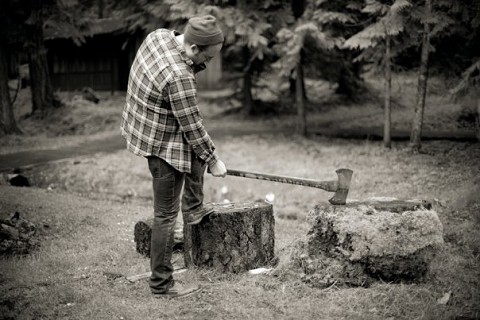By Josh Harrod Casper
I had read bits and pieces of her life through other works – who she was and who she is helping others become through her story. Dorothy Day was the founder of the Catholic Workers Movement, along with “co-founder/conspirator” Peter Maurin.
 Peter had led an interesting life himself, traveling from his birthplace in France, to Canada and eventually into the shared living room of Dorothy and her family. Peter was a man who lived in intentional and relational poverty and was inspired greatly by the writings and prayers of St. Francis.
Peter had led an interesting life himself, traveling from his birthplace in France, to Canada and eventually into the shared living room of Dorothy and her family. Peter was a man who lived in intentional and relational poverty and was inspired greatly by the writings and prayers of St. Francis.
Entertaining Angels is a movie about her life and though the title is a bit soft for the heaviness she carries, it was an important part of Dorothy’s life, as she grew closer to God’s heart for the poor.
Day didn’t always support the work of Christians and saw them as hypocritical. It was only seeing the Church care for the poor that she began to walk through her own “spiritual awakening”.
Day was a writer and was published in various “socio-radical” newspapers and as she founded the CWM, she, along with others, published The Catholic Worker.
It was also in writing that Day discovered that her radical words’ could not be substituted for radical action.’ This is not to say that her stories weren’t important, but I believe she grew to an understanding that it wasn’t fulfilling her restless heart and that her writing wasn’t feeding the hungry, though it was calling attention that people were starving and dying on the streets.
This is important to me, because I love to write. I love to process the world, but it is no good for me to write if I’m not… doing. Maybe someday, something will come from this advocacy, but as important as words are in a movement, the word “movement” itself requires us to… move.
One thing out of many things I love about Dorothy is that she made the church uncomfortable. She made the church ask hard and conflicting questions. “What are we to do with you Dorothy? You can’t tag your work with ‘Catholic’ because we can’t be included in all this ruckus you’re stirring up…” [This was basically the gist of that conversation and always a bit contradictory to the Gospel of Christ.]
There were a couple of scenes in this film that particularly made my breathing a bit irregular, and my heart seemed to beat beyond its capacity as it tends to do from time to time. I do love theatre because of its ability to reenact story that causes our bodies to react from emotion.
In one scene, Day had learned of a friend who had committed suicide in the bathroom of their house of hospitality. Enraged and discouraged from a string of hurtful accusations, Dorothy stormed into the church and stood at the bottom of the cross and screamed in tears at the pierced body of Christ:
“Where are you!?”
“I don’t see you!”
“Is this what you want me to do?!”
“You’re ugly…and you smell!”
“How… can anyone love you!?”
And it was with this last statement that I lost it.
In screaming at the broken body of Christ, she was screaming at the poor at the unlovable and at the stench and site of the ones nobody else wants to love.
We are the symbols of Christ’s broken body.
We hurt and bleed.
We are vulnerable to the elements of nature and the human condition.
Seeing Dorothy screaming at Christ’s body aches inside of me. It aches because it is the poor that has led me to God’s heart again. It is through the stench and strain, the confusion and lies, and the beauty of a full belly and heart that I find Jesus in the face of the Poor.
Because…sometimes it is me who wants to scream those words.
But instead I hear these, as Day spoke into the broken ones:
“No. You’re beautiful. I see light in you. I love you. I love you.”
 Josh is a Mississippi boy who now lives in Portland, OR. He is currently enjoying being a newlywed to his wife Hannah, who both met in 2007 while serving with Word Made Flesh in Calcutta, India. His interests include: books, gardens, racial reconciliation, southern cookin’, coffee and birds (in no particular order). Josh is also an aspiring: writer, Stumptown barista-extraordinaire and world-renowned southern chef. You can check out more of his “ramblins'” here.
Josh is a Mississippi boy who now lives in Portland, OR. He is currently enjoying being a newlywed to his wife Hannah, who both met in 2007 while serving with Word Made Flesh in Calcutta, India. His interests include: books, gardens, racial reconciliation, southern cookin’, coffee and birds (in no particular order). Josh is also an aspiring: writer, Stumptown barista-extraordinaire and world-renowned southern chef. You can check out more of his “ramblins'” here.
